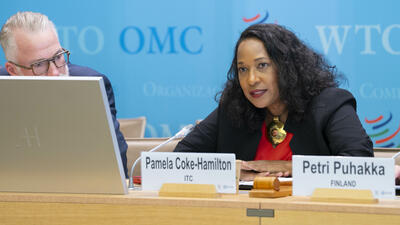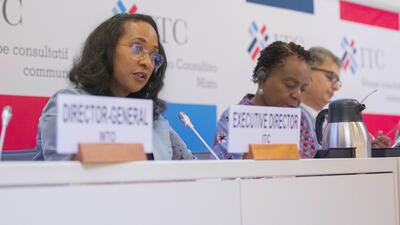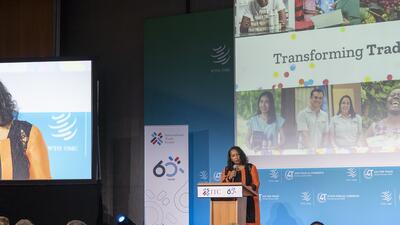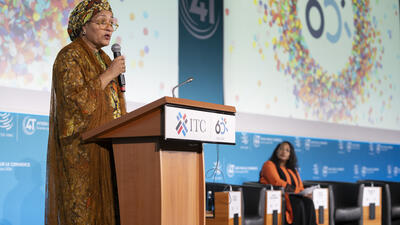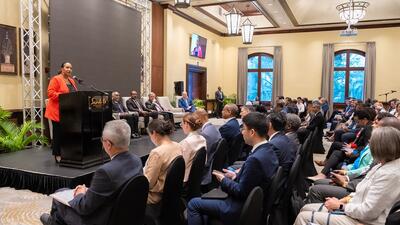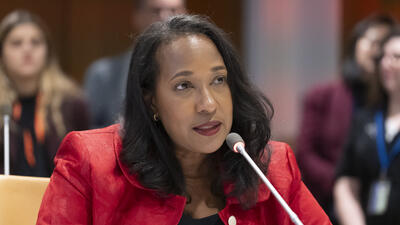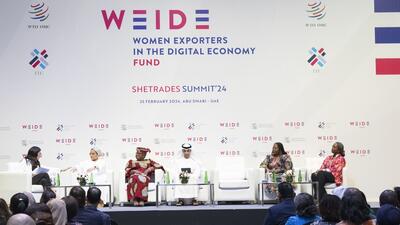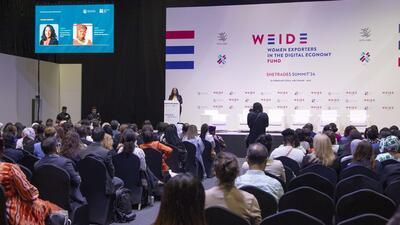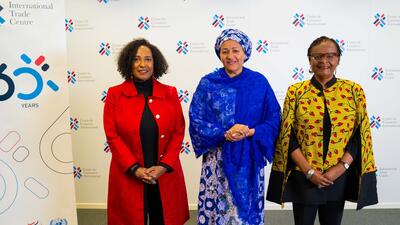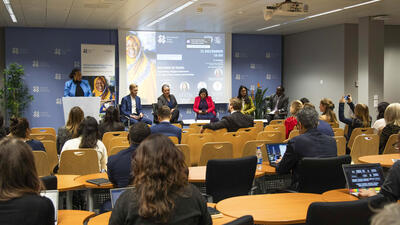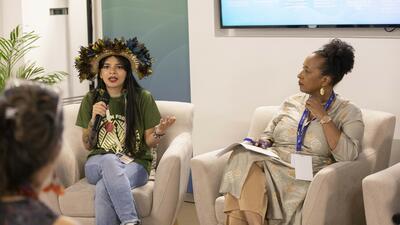
ITC Executive Director opening remarks at the Joint Advisory Group (JAG)
Chairperson Nadia Theodore of Canada
Director-General
And I’ll never get over the pleasure of acknowledging so many great female leaders on a single stage –
Dear Friends of ITC,
Let me kick off the 57th JAG by thanking my dear friend Usha from Mauritius for chairing last year’s JAG. Ambassador – I know I’ve mentioned this before, but you really did set a very high bar for a JAG chair.
Not just managing the speakers list calmly and efficiently, which is never an easy task in a multilateral setting. But – most importantly – you were an active and engaged Chair, echoing so many themes and stories that make ITC’s work special. I was so honoured to be in Mauritius this year to launch our SheTrades Hub. I’ll be back, and this time with nothing but a good book and a view of the beach. Thank you for your friendship and your support.
Let me also thank my fellow sister-in-arms, Ambassador Theodore, for accepting to chair this year’s JAG. I am proud to share the podium with someone who is not just an outstanding representative of Canada’s commitment to trade, development, inclusion and multilateralism, but also a proud daughter of the Caribbean.
Your father was the first calypso monarch of St Lucia, under the extraordinary name of “The Mighty Terra”. During his so-called “reign of terra”, he serenaded his island towards independence and helped to lay the foundations for a proud and confident Caribbean. Thank you for joining us today, Ambassador, and don’t hesitate to break into song if the moment carries you.
I’d also like to thank you, DG, and on the video screen, SG, for providing ITC’s twin identity as our parent agencies.
As ever, it’s easier to list the areas where we don’t collaborate. Our agencies partner on everything from trade facilitation and digital to sustainability and market intelligence. We have joined forces on the Global Trade Helpdesk and are building a Trade House for COP28. We are supporting the Cotton-4 countries and building the foundations for trade diversification in Least Developed Countries.
To both the DG and the SG – and the entire staff of both WTO and UNCTAD Secretariats – thank you for your cooperation, collaboration and shared work as we carry the Geneva Trade Hub forward.
Last year, I spoke to you at what I thought at the time – perhaps too optimistically – was, globally speaking, a low point. A time when the four Cs of COVID, climate change, conflict and cost of living were making the lives of our client MSMEs literally hell. When both our beneficiary countries and our funding partners were having to make difficult decisions on everything from funding to policy priorities. I thought that after so much human suffering at a global scale, it couldn’t possibly get any worse.
Well, here we are. If anything, last year brought even more volatility, uncertainty and complexity than the previous year. Even more setbacks to the Sustainable Development Goals, as we stand on the eve of the SDG Summit and a sobering stock-take of SDG indicators going into reverse.
I am not, by my nature, someone who likes to dwell on the negative. If there is a silver lining, I’ll take out my miner’s shovel and start digging. And when I look back on a year in global trade – on a year full of supply chain disruptions, difficult geopolitics and uneven recovery from COVID – I see that a change is coming.
It’s a change in horizons: our clients have not stopped looking for new routes to market. In fact, the uncertainty and volatility from the four C’s only accelerated the search for export diversification. Countries from small to large, from LDC to high income, recognized that a time of crisis is a time for change. A moment to revisit historical patterns of trade – so many of them shaped by geopolitics rather than economic logic – and find new, more sustainable and more equitable routes to international markets.
Second, I see a change in ecosystems. The unimaginable stresses placed on our MSME clients showed that – just as you need a village to raise a child – you need a flourishing, functioning private sector ecosystem to support small businesses and make value chains truly global.
This is a basic fact that, I think, tends to get lost in so many discussions these days about global trade. Call it near-shoring, call it de-globalization, call it re-globalization – the reality is that supply chains will not magically shift from one country to another simply because of a changing risk premium. It will shift because the new host country has competitive firms, strong business support organizations, the right policies and access to the best and most up-do-date market information.
Third, I see a change in objectives. The fragility and uncertainty that have faced ITC’s clients over this past year has only reinforced my firm belief that there is only one future for global trade. And that future is more inclusive, more connected and more sustainable. A future where we bend the arc of global trade towards the SDGs.
So that’s the change that me and my staff are working towards. To paraphrase one of my favourite songs, it might have been a long time coming, but a change is gonna come.
That positive change will only grow from past achievements. That’s why I’m proud to present ITC’s Annual Report from 2022.
Our Annual Report charts out a year of strong delivery, during the first year of our Strategic Plan for 2022 to 2025. A year where we helped our 130 beneficiary countries to diversify trade during times of crisis. A year when ITC flew the flag of MSMEs on the international stage, reminding the world that one cannot truly speak of an inclusive trading system while ignoring the majority of companies, the majority of workers and the majority of society.
As ever, one of the best parts of being ITC ED is that, ever year, I get to reel off an impressive list of things that my staff has achieved for our clients. For example:
- Our delivery in 2022 was over 150 million US dollars – our highest ever, following a previous record-breaking year in 2021.
- We received over 12 million dollars in so-called Window 1 funding that is corporate, unearmarked and flexible. W1 resources are critically important – for our impact, for new investments in priority areas, for more innovation, for new and more user-friendly tools and services, for keeping us agile and responsive.
- Last year, we reached nearly a million and a half registered users of ITC’s Market Analysis Tools. Over half a million clients gained greater awareness of international trade from using ITC’s business, trade and market intelligence tools. More than 40% of registered users of ITC’s Global Public Goods are women.
- Thanks to ITC interventions, more than 27 thousand MSMEs improved their competitiveness, of which 10 thousand were led by women. Thanks to ITC training and tools, nearly ten thousand MSMEs transacted international business of which more than three thousand were women-led MSMEs.
During 2022, we remained laser-focused on our priority countries – namely, least developed countries, landlocked developing countries, small-island developing States, conflict-affected countries and sub-Saharan Africa. We maintained our focus on the constituencies and communities most in need, particularly women-owned businesses, young entrepreneurs and vulnerable communities.
At last year’s JAG, I previewed what I called our four “moonshots”. These are four internal big “pushes” on green, gender, youth and digital. Four moonshots to make sure that ITC helps our client countries to tackle the structural problems that keep them trapped in commodity dependence and unequal trading relationships.
During 2022, the first small steps on the moon yielded promising results.
- Our digital moonshot, which we’ve called Switch ON, aims to connect and support 20,000 MSMEs and 4,000 digital entrepreneurs. Under this moonshot, we’ve already launched a pilot in Zambia where MSME entrepreneurs received half a million US dollar in new investment, with more to come.
- Our green moonshot has already transformed our ability to make a clear business case to MSMEs to go green, as well as our advocacy at platforms like COP and right here at the WTO during Environment Week.
- Our youth moonshot is bringing the voice of the next generation into global trade, equipping them with the skills and training they need to turn their energy and ideas into exports and livelihoods.
- Our gender moonshot, building on the phenomenal success of our SheTrades Initiative, is expanding our advocacy and outreach to even more women, even more countries, even more sectors, even closer to the ground.
Every ITC Annual Report is full of great stories. I encourage all of you to look at the eighteen case studies that we have featured in this year’s publication. Let me quickly highlight four of them which speak to the breadth and depth of ITC’s work.
First, to Iraq under our EU-funded SAAVI project. In November 2022, ITC collaborated with our Iraqi counterparts and UN partners to convene the first ever Iraq National Trade Forum. The Forum in Baghdad gave Iraqi MSMEs the chance to do business and secure investment, convening 170 B2B sessions that facilitated 2.5 million US dollars in potential deals.
But the Forum did so much more than just create new business linkages. It also gave Iraqi MSMEs a voice on public-private stage. It showed their potential to contribute to economic growth, diversification, job creation and resilience.
The voices of those same Iraqi MSMEs will be featured, along with many others from our project portfolio, in our upcoming flagship publication that we call the SME Competitive Outlook. This year’s SMECO will focus on fragility and its implications for small businesses.
Second, to Dadaab in Kenya, once the world’s largest refugee camp. In 2022, our Refugee Employment and Skills Initiative or RESI project provided training, mentorship and ecosystem building to support the inclusion of refugees and host communities in Kenya.
This partnership with the Norwegian and Danish Refugee Councils created market linkages that enabled refugees to earn money online through companies like Amazon Web Services. The RESI project enabled young entrepreneurs from Dadaab to earn tens of thousands of dollars in extra income, while creating a sustainable ecosystem for digital entrepreneurship.
Third, to mine and Ambassador Theodore’s home region of the Caribbean. Through our UK-funded UK Trade Partnerships Programme, ITC helps artists and producers from the Caribbean to access music markets in the UK and the EU.
Just to take one example from UKTP’s work last year, the programme helped a young St Lucian artist named Sherwin “Dupes” Brice to bring his uniquely Caribbean blend of pop, reggae and R&B to the WOMEX festival in Lisbon. You’ll see and listen to more about UKTP’s work in the Caribbean in a short video later on this afternoon.
Last but certainly not least, a fourth case study is from a country I will be visiting next week, a trip initiated by the WTO Director-General: Colombia. Through our EU-funded Colombia PUEDE project, ITC helped a group of producers literally bring the fruits of peace to the world.
The project worked with communities in the south of Colombia that have felt the brunt of armed conflict, poverty and disenfranchisement. The project focused on 20 farmer associations, covering more than 2,000 smallholders. Through training on agricultural best practices, productivity enhancements and quality certification, Colombia PUEDE created 200% increases in farmer productivity, hundreds of new certifications for export and a nearly 250% increase in farmer incomes.
These are only four of the many inspiring impact stories that you will read about in our 2022 Annual Report.
It goes without saying – we could not have achieved any of this without the support of our funders.
Let me first individually acknowledge our Window 1 funders who contributed in 2022:
- Canada
- Finland
- Germany
- Ireland
- Iceland
- India
- Norway
- Sweden, and
- Switzerland
And I’d like to acknowledge individually our funders who provide us the resources to scale our interventions through earmarked funds for specific projects. In 2022, these were:
- Australia
- Belgium
- China
- the European Union
- France
- Germany
- Japan
- Korea
- the Netherlands
- Qatar
- Sweden
- Switzerland,
- the United Kingdom, and
- the United States.
I’d also like to thank the many foundations, intergovernmental organizations, UN partner agencies and private sector partners who have provided their time, ideas, energy and funding. There are too many to list here but it shows that when you are focused on solutions and delivering for those who need help the most, there is never a shortage of helping hands.
Of course, none of this would have been either without your support through the ITC regular budget. Fresh from mine and Dorothy’s meeting with the CBFA on Tuesday, I’d like to thank the entire WTO and UN membership for their faith in ITC.
Having looked back, let me now look forward.
Our delivery for 2023 is on track at this mid-year point. We have a healthy project pipeline, with strong commitments from many funder countries represented here today.
This year, we’ll keep moving forward on our resource mobilization, especially during this critical period when funders are programming for the medium-term and difficult budgetary choices are being made.
We’ll keep working on our strategic planning, governance and risk management – you’ll hear more about this from my colleague Miguel during his presentation of our Annual Evaluation Synthesis Report.
And while today’s discussion is focused on ITC’s work and achievements in 2022, I want to speak to an initiative that kicked off in 2023, but – much like the moonshots – will no doubt help define the future of ITC.
That initiative is called ITC Moving Forward. A comprehensive roadmap to build a stronger ITC, tackle prohibited conduct and create a better workplace.
The six-point action plan on prohibited conduct has already yielded results. We’ve had a full independent review of our processes and policies on prohibited conduct and we are busy implementing its recommendations. I have created an Ombudsperson function and will soon create a stand-alone, in-house investigations function to ensure that any staff issues or grievances are dealt with expeditiously and fairly. Going forward, I will be reporting to the JAG on both the incidence of prohibited conduct, how we are handling cases and how we are protecting victims.
A separate twenty-point action plan to create a better workplace will focus on tackling every possible obstacle to us delivering as one ITC. This covers many areas, but just as a taster:
- We’re looking at our core operational processes to ensure they are match-fit for a more complex world, where ITC needs to operate as close to our beneficiaries as possible.
- We’ve created entirely new channels for dialogue between staff, and between staff and management.
- We’re looking at the entire career journey of ITC personnel – from induction, to upskilling, to mobility and performance assessment – to ensure that we grow and retain talent in-house.
- We’ve begun an overhaul of the conditions and framework for managing consultants, and as of two weeks from now, we will begin financially supporting our interns. I believe this measure is vital to ensure that the ITC family is not just young and energetic but also reflects the type of gender and geographic balance befitting an agency that serves 193 members states.
As the many working groups and internal reviews under ITC Moving Forward present their recommendations to me and my senior team, I will be reporting regularly to members through our various governance bodies.
All of this work is merely a response to your trust, as our UN and WTO members, in ITC’s management and strategic priorities. As we head into our sixtieth anniversary, with so much to celebrate with our two parent agencies, I want to sincerely thank you for that trust.
Let me close by giving you just a snapshot from my recent travels. An ever-useful reminder – with our inboxes full of meetings, admin headaches and strategy documents – of why we do what we do.
Let me take you back to Dadaab. In early May, I had the honour and privilege to meet the women of “Nyota Farsamo”, one of the Dadaab refugee supported by our RESI project.
"Nyota" is Swahili for star and "Farsamo" is a Somali word for artisan. They hand-weave the brightly coloured sisal baskets that are featured in many shops throughout Nairobi.
These amazing women told me how making these baskets gives meaning to their day. Together with other women from refugee and local communities, they engage in a collective and creative activity. They support each other to improve their skills and improve their lives.
They told me about how the work gives them a sense of self-esteem, enabling them to afford books and school uniforms for their children. How it gives them a sense of independence. The work has even shifted the mindset of the men in their families: the same husbands who used to protest every time their wives went out to for the training sessions, but now happily wave them off to all the market fairs.
Honestly, I left that meeting with tears in my eyes. The stories and journeys of the women of Nyota Farsamo show the core of ITC’s mission. No logframe or project document could have better demonstrated that if there truly is a change in global trade coming, it will start right here.
So it makes sense that I conclude by thanking my own ITC family. For their long hours of hard work, dedication to the cause and endless creativity. Fresh of a wonderful World Export Development Forum in Mongolia, I want to reiterate my thanks to all ITC personnel:
- For meeting small businesses around the world – not where we sometimes wish they were, but right where they are, in some of the most difficult places and the most difficult circumstances.
- For walking the talk.
- And for being part of the change that we are seeking in global trade.
Thank you.




